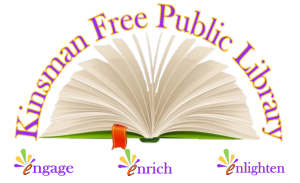Children's Literacy Programs
At KFPL, we foster children's literacy with our collections, services and programs such as:
- Kids' Birthday Book Club
- STORYTIME & LITERACY PROGRAMS
- DOLLY PARTON'S IMAGINATION LIBRARY
- STORYWALK®
- LITTLE FREE LIBRARIES
What is Early Literacy?

Early literacy does not mean teaching young children how to read. Instead, it means helping children develop the skills they will need to become successful readers. Early literacy activities build rich language skills: vocabulary, self-expression, and understanding (comprehension). These skills help children make sense of printed words when they start reading.
Children’s Librarians have identified five early literacy practices that help children get ready to read. Here is a list of the five early literacy practices, and some activities you can do with your child to develop his or her language skills:
Playing | Singing | Reading | Talking | Writing
Playing Children learn how to express themselves when they play. They also discover the meaning of words, and how to tell stories. When they learn new words through play, they will recognize those words in print when they start reading. Learning how to tell stories builds reading comprehension.
- Let your child play dress-up with old clothes, hats, and jewelry.
- Act out favorite stories with stuffed animals or puppets.
- Play with blocks. You can pretend you are building castles, skyscrapers, or whatever you like.
Singing helps children hear how words can be broken down into smaller parts. This skill will help them sound out words when they start reading on their own. Songs also teach new vocabulary, and introduce new concepts.
- Sing lullabies at bedtime.
- Sing along with children’s CDs. The library has a great selection.
- Many picture books illustrate popular children’s songs. Ask a librarian to help you find books you can sing together.
Reading with your child is one the best ways to help children get ready to read on their own. The language in books is much richer than the language we use every day. This means reading expands your child’s vocabulary. Hearing lots of “rare words” in early childhood will help your child recognize words in print when he or she starts reading. This means he or she will understand what they read.
- Read with your child every day!
- Read package labels at the grocery store.
- Point out words and letters as you read to your child.
Talking with your child is one the best ways to develop language and early literacy skills. Conversations help a child express thoughts, learn what words mean, and gain new information about the world. Talking also gives children a rich foundation of knowledge they can apply to their independent reading. The more children know about the world, the more words they will recognize on a printed page or digital screen.
- Ask your child open-ended questions. These are questions that can’t be answered with a simple “yes” or “no.”
- What did you do at the park today?
- What will happen next in our story?
- If your child tells you a word, add more words. If your child says “fire truck,” reply, “Yes, that’s a big, red fire truck. It has a siren on top. The siren makes a loud noise to tell people to get out of the way. The fire truck is going to help people.”
- Talk about your daily routines as you do them. For example, “We are going to make dinner. First we get the ingredients out. The ingredients are the things we use to make our food. Then we get the pots, pans, and measuring cups. Can you help me measure the ingredients and put them in the pot?”
Writing activities help children learn letter names and sounds. Writing, or scribbling and drawing, also helps children learn that marks on paper represent spoken language. This knowledge will help them decode words on pages and screens when they start reading.
- Let your child help you write a grocery list.
- Ask your child to draw a picture of everything in his/her room. Help your child write the name of each object in the room.
- Help your child write name tags for his/her stuffed friends.
